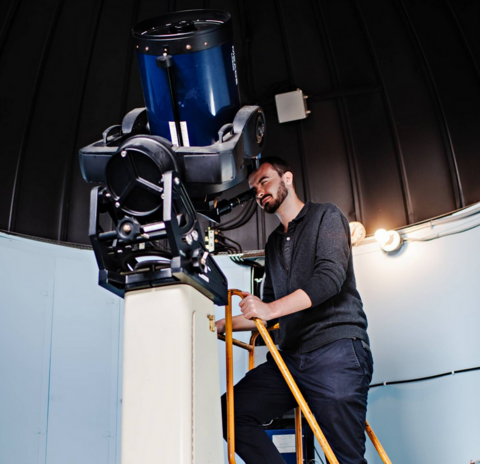
Science Teaching Complex (STC) and Quantum-Nano Centre (QNC) Buildings Located on Waterloo's Campus.
Be at the cutting edge of discovery in one of the largest physics and astronomy graduate programs in Canada.
The department’s tradition of collaboration and innovations offers a rich and varied graduate experience that’s unparalleled. You’ll work closely with a supervisor to perform original research in an area of physics, culminating in a PhD thesis. Funding will be provided to cover tuition and some living expenses.
Research fields
- Astrophysics and Gravitation
- Atomic Molecular and Optical Physic
- Biophysics
- Chemical Physics
- Condensed Matter and Materials Physics
- Industrial and Applied Physics
- Quantum Computing
- Subatomic Physics
Program overview
Department/School: Physics and Astronomy
Faculty: Faculty of Science
Admit term(s): Fall (September - December), Winter (January - April), Spring (May - August)
Delivery mode: On-campus
Program type: Doctoral, Joint, Research
Length of program: 48 months (full-time)
Registration option(s): Full-time, Part-time
Study option(s): Thesis
Application deadlines
- January 9 (for admission in September)
- June 1 (for admission in January of the following year)
- October 1 (for admission in May of the following year)
Key contacts
Sophie Gagnon
sm2gagnon@uwaterloo.ca

I feel like everyone has at least a little bit of this fascination with space and the universe. Being able to share that sense of wonder with people is something I really enjoy.
Supervisors
- Review the finding a supervisor resources.
Admission requirements
- Normally a master's degree in physics, with at least a 75% standing.
- Students with an undergraduate degree in physics may apply for admission directly to the PhD program. Successful applicants will have an outstanding academic record, breadth of knowledge in physics, and strong letters of recommendation.
Degree requirements
- Review the degree requirements on the Graduate Studies Academic Calendar, including the courses that you can anticipate taking as part of completing the degree.
- Check out Waterloo's institutional thesis repository - UWspace to see recent submissions from the Department of Physics and Astronomy graduate students.
Application materials
- Program-specific questions (PSQ)
- These are questions specific to the program you’re applying to. They can be viewed once you’ve started an application and are completed through a form in the online application.
- Transcript(s)
- References
- Three academic references are required.
- Proof of English language proficiency, if applicable
- TOEFL 4.5 (writing 5, speaking 5), IELTS 7.0 (writing 6.5, speaking 6.5)
Tuition and fees
- Visit the graduate program tuition page on the Finance website to determine the tuition and incidental fees per term for your program.
-
Review living costs and housing.
-
Learn about the PhD housing guarantee program for admitted students in fall 2026 and winter 2027.
-
- Review the funding graduate school resources for graduate students.